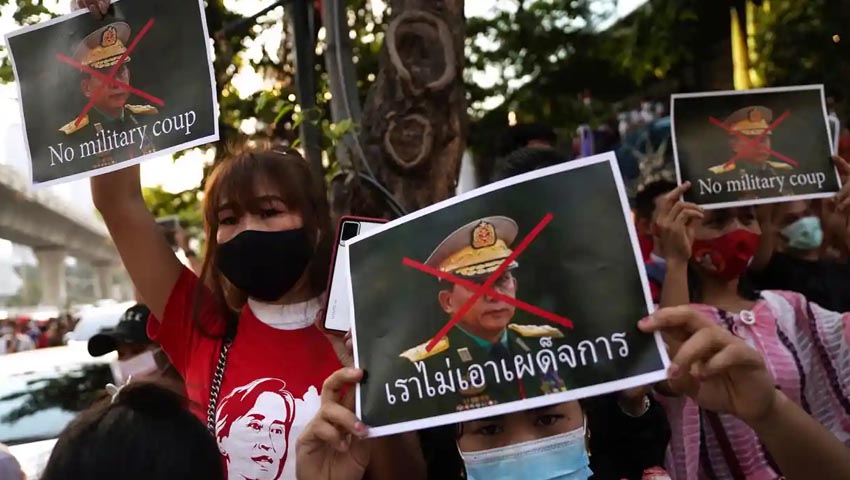Myanmar boycotting ASEAN, ASEAN holding the military junta to account over human rights, and competition between global superpowers in southeast Asia. Read the latest coverage of Myanmar’s troubled relationship with ASEAN.
To continue reading the rest of this article, please log in.
Create free account to get unlimited news articles and more!
It was revealed that Myanmar snubbed this year’s annual ASEAN Summit on Tuesday, as the country’s military junta refused to send delegates to the meeting over ASEAN’s decision to uninvite the country’s highest ranking general in favour of a consensus representative.
The Association’s historic decision to take a stand in Myanmar’s internal affairs comes following a coup by the Burmese military in response to the election of Aung San Suu Kyi’s National League for Democracy earlier this year, which resulted in the junta jailing numerous opposition politicians and journalists and sparking widespread protests across the country.
“ASEAN on October 15 agreed to bar Myanmar’s military chief Min Aung Hlaing, who toppled a civilian government on February 1, over his failure to implement a peace plan he agreed with ASEAN in April towards ending a bloody political crisis triggered by the coup,” Al Jazeera reported.
However, it was the uncharacteristic decisiveness of ASEAN’s determination that sparked the intrigue of analysts across the world.
Adam Simpson, senior lecturer at the University of South Australia, argued in ASPI’s The Strategist last week that “historically, ASEAN has been largely toothless in its reaction to human rights abuses in the region”.
“That changed at the emergency meeting of ASEAN foreign ministers held on 15 October. The statement released afterwards began with a discussion of the five-point consensus reached with Myanmar general and coup leader Min Aung Hlaing in April and the role of the special envoy, who had just cancelled his visit to Myanmar after being refused access to Aung San Suu Kyi and other junta opponents,” Simpson observed.
Historically ASEAN has prioritised non-confrontation among member states, especially in areas concerning human rights abuses, making the fact that regional governments held the junta to account with public statements even more interesting.
Singapore’s Prime Minister Lee Hsien Loong told the junta "to immediately release all political detainees".
Meanwhile, Indonesia’s Foreign Minister Retno Marsudi noted that “the people of Myanmar have the right to live in peace and prosperity and Indonesia has consistently hoped that democracy through an inclusive process can be quickly restored in Myanmar”.
However, the junta was quick to shift blame arguing that ASEAN’s October 15 decision to uninvite Myanmar’s leading general was spurred by US and EU meddling in regional affairs.
“The Myanmar military blamed the ASEAN decision on ‘foreign intervention’ by the US and EU, but responded almost immediately with an announcement that thousands of people who had engaged in anti-coup protests would either be released from prison or have their charges dropped,” Simpson argued.
“While many journalists and activists were released, some members of the ousted National League for Democracy were immediately rearrested.”
Despite this, analysts from around the globe have theorised that Myanmar could become a flashpoint for superpower competition in the region.
It was widely reported that despite the military banning overseas flights after seizing control of the country in February, flights between Myanmar and China carrying goods and people were landing in the country every day prompting speculation of co-operation between the junta and the Chinese government.
While there is evidence to support this theory, it oversimplifies years of politics in Myanmar. In fact, the democratically elected National League for Democracy had significant relationships with China.
Even before the junta in January 2020,Hunter Marston posted an article in The Diplomat with the headline 'Has the US Lost Myanmar to China?', noting that “China-Myanmar diplomatic relations and further cemented bilateral relations, which have been in general extremely positive since the West turned away from the embattled country in light of the Rohingya migrant crisis that erupted in 2017.”
Meanwhile, Lucas Myers in Foreign Policy last month noted that “Beijing fostered relatively warm ties with the NLD government led by Aung San Suu Kyi”.
Neither paints a clear picture on where either the democratically elected government, nor where the junta stands in relation to the Chinese government. It would appear as though both the military and opposition possess deepening relationships with their north-eastern neighbour.
Nevertheless, ASEAN has hit an inflection point and appears more likely to hold member states to account for human rights abuses posing the question – how else might ASEAN flex its muscles and how will this impact superpower competition?
Get involved with the discussion and let us know your thoughts on Australia’s future role and position in the Indo-Pacific region and what you would like to see from Australia's political leaders in terms of partisan and bipartisan agenda setting in the comments section below, or get in touch with

 Login
Login







